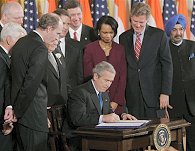2006年VOA标准英语-Bush Signs Law Implementing US-India Nuclear De
搜索关注在线英语听力室公众号:tingroom,领取免费英语资料大礼包。
(单词翻译)
By Paula Wolfson
White House
18 December 2006
President Bush has signed legislation clearing the way for U.S. civilian1 nuclear cooperation with India. VOA's Paula Wolfson reports administration officials see it as a landmark2 event, ushering3 in a new strategic partnership4 between Washington and New Delhi.
 |
| President Bush, seated, center, surrounded by members of Congress and officials, signs US-India Peaceful Atomic Energy Cooperation Act at the White House, 18 Dec 2006 |
"The relationship between the United States and India has never been more vital, and this bill will help us meet the energy and security challenges of the 21st century," he said.
With the stroke of a pen, Mr. Bush ended a three-decade-old ban on U.S. civilian nuclear cooperation with India, enabling the agreement he signed earlier in the year with Indian Prime Minister Manmohan Singh to go forward and signalling a major shift in United States policy.
The legislation he signed, in essence, exempts5 India from U.S. law that bars civilian nuclear trade with countries that refuse to sign the Non-Proliferation Treaty. Washington banned such exports to help stop the spread of nuclear weapons.
President Bush stressed India has always conducted its program in a safe and responsible manner. And he noted6 that in return for American technology, India has agreed to open its civilian nuclear-power program to international inspectors7 for the first time.
"This is an important achievement for the whole world," he said. "After 30 years outside the system, India will now operate its civilian nuclear energy program under internationally accepted guidelines - and the world is going to be safer as a result."
But India's nuclear weapons program will remain off-limits to inspectors. Before the signing ceremony, Undersecretary of State for Political Affairs Nicholas Burns, the chief U.S. negotiator on the nuclear deal, said the administration felt it was acceptable to separate out India's nuclear arsenal8 in order to get the civilian nuclear agreement.
He said India has been a good steward9 of its nuclear weapons arsenal. And while he made clear the United States would prefer to see India give up its nuclear arms, he said it is now time to bring a country that "has not cheated into the international system."
Burns said while the nuclear cooperation deal is vital on a strategic level, it also has economic and environmental benefits for both India and the United States.
At the signing ceremony, President Bush noted that it will help ease India's energy demands, and reduce its reliance on fossil fuels.
"India is now the world's fifth largest consumer of energy - and its demand for electricity is expected to double by 2015," he said. "The United States has a clear interest in helping10 India meet this demand with nuclear energy."
Several hurdles11 remain before U.S. nuclear transfers to India can begin, including approval by the 45-member Nuclear Suppliers Group, which regulates nuclear trade, and the International Atomic Energy Agency.
But Burns indicated moving forward should not be a problem, saying many other countries were waiting for the United States to take the first step. He predicted all the necessary action will be taken in about six months.




